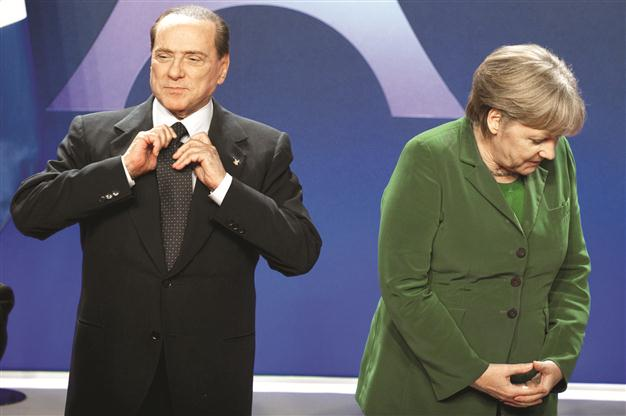Italy’s finances fall under IMF surveillance, EU officials say
CANNES, France - Agence France-Presse

Italian Prime Minister Silvio Berlusconi (L) adjusts his tie next to German Chancellor Angela Merkel before posing for a family photo on Nov 3, during the G-20 Summit in Cannes, France. AFP photo
The International Monetary Fund (IMF) and European Commission will strictly monitor Italy to reassure markets that it is meeting targets to reduce its budget deficit, European officials said on Friday.But an Italian government source quickly denied that the agreement implied a formal “surveillance” mechanism, and said instead that Rome would seek “advice” from the IMF on the issue.
While it had been agreed earlier the EU’s executive would step up monitoring of Rome, European leaders meeting on the margins of a G20 summit had decided to bring in the IMF to increase the credibility of the surveillance and reassure the markets, the senior officials said.
The IMF’s advice is expected to play a complementary role to the European Commission’s monitoring, added the Italian source.
Investors forced up the Italian government’s 10-year borrowing cost to a euro-era record 6.402 percent on Thursday.
ECB forced to buy bonds
The European Central Bank (ECB) was forced to step in and prop up the Italian bond market in August when the rates soared above 6 percent, a level considered to be unsustainable. It was reported then that the ECB had sent the Italian government a list of policy changes to be made.
After the European Union decided to force investors to take losses on Greek bonds, attention turned to Italy, where the anaemic growth rate makes it increasingly difficult for Rome to manage its debt which is equal to 120 percent of the national output. Italy’s government adopted two austerity packages during the summer, but markets have remained skeptical that the measures will eliminate the deficit and boost growth.
At the G20 summit on Thursday, Prime Minister Silvio Berlusconi vowed to stick to Italy’s target of balancing the budget by 2013 and that new austerity measures would be fully enacted by the end of the month.
An emergency cabinet meeting on Wednesday adopted reforms including state asset sales, tax incentives for recruiting workers, measures to boost market competition and the unblocking of billions in aid for southern Italy.
The measures, which still have to go before parliament for final approval, stopped short of major changes such as higher taxes for the wealthy, a one-off levy on current accounts and a housing tax that had been mooted in recent days.
















